When I was 20, I dropped out of university to live on a road protest. I was terrified by the oncoming apocalypse of climate change, and loathed the short-term, environmentally catastrophic logic that prioritised road-building over trees. The data, even in 1997, was clear: human activity was heating the globe, with increasingly devastating effects. Time was short, and a sea change in behaviour was required.
Nearly a quarter of a century has passed since then, and very little has been achieved, thanks in large part to corporate interests invested in maintaining our dependence on non-renewable resources. Far more people understand and accept the reality of anthropogenic climate change, and yet we seem paralysed by despair, caught in a spell of inertia, even as the most lurid of predictions – floods, fires, plagues – come to pass.
I say we, but the generation born into the reality of global heating are refusing to accept this lethal status quo. The testimonies of these teens and early twenty-somethings are humbling and often thrilling. By setting up a student bank based on recycling waste, Jose Adolfo Quisocala single-handedly changed child poverty and environmental pollution in his town in Peru. Though their projects vary widely, these young activists have a strikingly shared sense of what must be changed, from education and the foregrounding of indigenous voices to making people appreciate the value of nature.
As Hilda Flavia Nakabuye, an activist from Uganda, says: “We are a generation of scared people. But we are very persistent. And very united.” This is the kind of vision and ambition necessary from the delegates at COP26. The stakes could not be higher. If only our leaders had the courage of these kids. Olivia Laing
Marinel Ubaldo, 24, Philippines
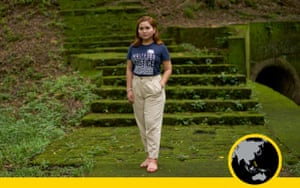
It was in November 2013 that the urgency of the climate crisis became clear to Marinel Ubaldo. A typhoon had been forecast in the Philippines and it was due to hit the peaceful village in Eastern Visayas where she lived with her family. Initially, she wasn’t especially worried. “We had been living with typhoons all our lives – it was not new to us,” she remembers. Her father, a fisherman, told her to go to a nearby shelter that was on higher ground. It was the right decision: Haiyan hit the Philippines with winds up to 195mph, one of the world’s strongest ever typhoons.
Buildings that Ubaldo had thought were strong were ripped apart in seconds. More than 7,360 people were killed or went missing and at least 4 million were displaced. The disaster dramatically altered the way Ubaldo saw the planet. “It gave me a new perspective on what the future could be,” she says.
Two years later, Ubaldo won a scholarship to study social work in Tacloban, a city devastated by the typhoon, working alongside studying so that she could help her family, who had lost everything as a result of the typhoon. Increasingly, she devoted her time to fighting the climate crisis.
Ubaldo has since protested at Shell’s Manila headquarters, in front of the Wall Street Bull in New York, and helped organise the first climate youth strike in Eastern Visayas. Her proudest moment, she says, was testifying as a community witness to the Philippines Commission on Human Rights as part of their investigation into corporate responsibility for climate change. In 2019, the commission found that 47 major oil, coal, cement and mining companies could be held liable for the impact of their operations on Filipino citizens. The landmark ruling illustrated “the power of people”, says Ubaldo. “Even if you are poor, or just only one, or from a remote community, you have power. You can always call out corporations and leaders who are fuelling climate change.”
Ubaldo, who now works full time on climate issues, focuses on supporting grassroots initiatives. She co-founded the group Youth Leaders for Environmental Action Federation, is a climate justice youth adviser for Greenpeace Philippines and also works with Living Laudato Si’ Philippines, an interfaith movement that advocates for the divestment of coal.
Her work is high risk. According to Global Witness, 29 activists were killed last year in the Philippines. It is common for activists to receive threats or be subject to “red tagging” – labelled by the state as communists or terrorists. Last year, four activists and a journalist from Tacloban were arrested for possession of firearms following an illegal raid. It has been claimed that security forces had falsified evidence and Amnesty International has called for an investigation. At the time of the raid, Ubaldo received a message suggesting she too would be arrested and moved to stay with a friend as a precaution.
“The thing is,” she says, “they don’t just come for you, they come for your family, for your friends… That worries me more than my own safety.” But the threats, she says, are at least a sign that those in power are hearing your voice.”This is very personal for me. If I do not continue fighting I will feel that I am betraying the people who perished because of climatic disasters. Because they are not just numbers, they are not just climate statistics.”
Who is your climate villain? “The corporations, all of them. They are profiting from our suffering.”
Lab beef or grass fed? “I don’t eat meat but I have to remain pescatarian or my father [a fisherman] would be really angry. When I go home I love to eat paksiw fish, which is cooked in soy sauce, vinegar and a little oil with onion and garlic. Everything is just fresh, even the herbs that you put on your food – you can just get them outside of your house.”
If you had the power to make one change to combat the climate crisis, large or small, what would it be? “I would go to the community and ask them what they want and support their own grassroots climate actions. And I would let the fossil fuels stay in the ground.” Rebecca Ratcliffe
Anjali Sharma, 17, Australia
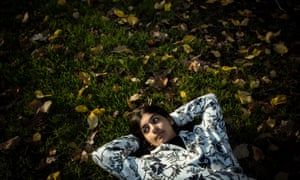
Not many 17-year-olds have ground-breaking judicial decisions named after them, but as lead litigant in Sharma and others v Minister for the Environment, Anjali Sharma achieved that world first when Judge Bromberg ruled in May this year that the minister did have a duty of care not to harm children.
Sharma became involved in School Strike 4 Climate in 2019 after hearing about the impact climate change had on relatives who are farmers in India. “This stuff drives people to anxiety, it drives people to tears because it’s just so real for us right now,” she says.
Her hope with the legal case was to stop the extension of a coal mine in New South Wales. But last month, the expansion was approved. Sharma found out by text message between school exams. “We went to court in a completely novel legal battle and we won, and yet [Australian environment minister] Sussan Ley approved the mine. Sometimes it feels like nothing is happening,” she says.
Plenty is happening for Sharma. First, the Australian government is appealing against the duty of care ruling later this month, then she has exams. She’s also focused on her twin passions of music and netball. “At school everyone knows me as ‘that kid’. It’s completely different when I go to netball where I can be a normal teenage girl – because that’s what I am.”
If you could make one change… “I’d cut all Australian government ties with mining companies such as Origin and Santos, which have constantly procured grants for new fossil fuel exploration projects and influenced Australia’s climate policy due to their Australian political connections. Instead I’d have our climate policy influenced by our First Nations people and those on the frontlines. These are the people who have a true connection and love for the land.” Meg Keneally
Aadya Joshi, 18, India/US
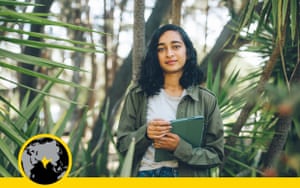
For years, twice a day Aadya Joshi walked past a scrapyard in her neighbourhood of south Mumbai on her way to and from school. Originally meant to be the garden of the local police station, it had become an overgrown, toxic eyesore with a decade’s waste festering in the heat. When she was 15, in her summer holidays, Joshi decided to do something about it.
“I walked in to the police station and was like, ‘Can I please clean your garden?'” recalls Joshi. “It took three or four weeks of me just being like, ‘Please, please, please, please, please,’ and coming back every day, rain or shine. I had to convince them that I was not going to flake halfway and leave them with more work.”
The plot of land is long and thin: about the dimensions of a cricket wicket. But, over the course of four Sundays in the summer, with help from local residents, Joshi did more than clear it. She replanted it with native Indian plants and trees. It was gruelling but rewarding work: “When I say toxic I really mean it,” says Joshi. “The first day that we cleaned up I made the mistake of not wearing gloves and I was sick for two weeks.”
The idea for native planting came from Joshi’s reading on the Miyawaki method of afforestation and the work of University of Delaware ecologist Douglas Tallamy. These both argue that planting the right trees can have a significant impact on restoring insect and animal biodiversity. The results in Mumbai were pretty well instantaneous: monkeys now hang out at the police station, and butterflies and birds have made the garden their home.
“It’s definitely difficult being a kid telling adults what to do,” says Joshi. “Not everyone is always receptive, but I think there’s a benefit with having actual science to back up what you’re saying.”
After creating the garden, Joshi developed a database of 2,000 plants indigenous to the Indian subcontinent and last year was awarded the annual Children’s Climate prize, founded by Swedish energy company Telge Energi. She also began planning larger projects, but these were curtailed first by Covid, and now because she has just started as an undergraduate on the Earth Systems Program at Stanford University. Her advice for others looking to follow in her footsteps is to start small. “If you bite off more than you can chew in the beginning, you stagnate and you lose motivation,” she says. “But something small, like your neighbourhood police station, it’s very manageable.”
Who is your climate hero? “Dr Douglas Tallamy. His book Bringing Nature Home is all about how native plants preserve biodiversity. The whole point was to take that research and put it into a local context for India.”
How do you relax? “A good book. Recently Indica: A Deep Natural History of the Indian Subcontinent by Pranay Lal and In the Kingdom of Ice by Hampton Sides. It’s very depressing, but it’s very good.”
If you could make one change… “It would be to plant native everywhere.” Tim Lewis

Hilda Flavia Nakabuye, 24, Uganda
“Your beds may be comfortable for now but not for long,” Hilda Flavia Nakabuye told the 2019 World Mayors Summit in Copenhagen. “You will soon feel the same heat we feel every day.” As a child, Nakabuye watched heavy rains, strong winds and drought gradually devastate her grandparents’ farm. Cassava, matoke and potato gardens withered; livestock died and eventually her family was forced to sell off the land.
At Kampala University, she made the connection that their suffering was a direct result of global heating and in 2019 she founded Uganda’s Fridays for Future campaign, which now has 53,000 youth members. Nakabuye is fiercely critical of the unequal representation of countries from the global south in terms of decision-making . She is campaigning for equal participation for the Most Affected People and Areas (Mapa) at Cop26, where she says it is vital to drum into world leaders that “global emissions are [currently] expected to rise by 16% by 2030 yet we need to drop them by 50% by 2030.”
“We are a generation of scared people,” she says, “but we are very persistent. And very united.”
If you could make one change… “Haha, that sounds like a lot of power! Within one hour I would shut down all fossil fuel industries.” Sarah Donaldson
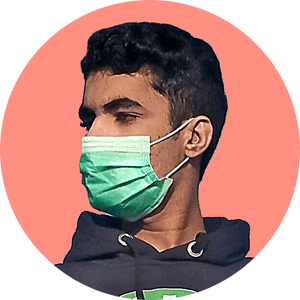
Yusuf Baluch, 17, Pakistan
Yusuf Baluch became an activist last year in the wake of a massive forest fire near his home town of Gwadar, southwest Pakistan, though he says the climate crisis has shadowed his life since childhood. Now he spends much of his time organising for Fridays for Future and engaging in school strikes, despite the threat of arrest from Pakistan’s military. “Giving up is not an option,” he says. “I have to fight on.”
If you could make one change… “There should be climate clubs and centres everywhere, at a local level, so people can get educated – so we can fight this together.” Killian Fox
Vic Barrett, 22, US
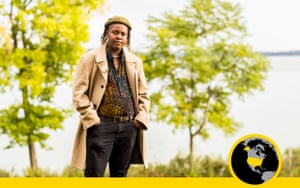
Vic Barrett does not speak Polish. The tattoo artist he met did not have much English. But, during some downtime at the 2018 United Nations climate change conference in Katowice, Barrett presented his arm to him along with a rough sketch of a geometric design featuring the number “370”, the “greater than” sign and two diamonds. “We still had a pretty good time,” says the 22-year-old Barrett now, laughing. “And it was a special trip and it just felt right to somehow commemorate it.”
The 370 in the tattoo refers to a measurement in parts per million of carbon dioxide in the atmosphere: this was the level it was at when Barrett was born in 1999. It’s now more than 400ppm, which most scientists agree is a hazardous indicator of human-made climate change. Barrett turns serious: “The tattoo is a reminder to myself and to others that there are generations of young people who have been born into a world that we know scientifically is incapable of sustaining them,” he says. “It’s highlighting this unique experience of being a young person on the planet right now.”
Barrett’s awakening to the climate emergency came in 2012, when Hurricane Sandy tore up the east coast of North America. He was living in New York and while the damage was widespread – around 650,000 homes were destroyed; 8.5 million people were stranded without power – he noticed that the devastation was especially severe for low and middle-income people, whose homes were more likely to be built in flood-prone areas and who were less likely to have insurance. Aged 14, Barrett, who has black and indigenous Honduran heritage, began working with the nonprofit Global Kids and dived deep into “environmental racism”.
In 2015, Barrett was one of a group of 21 young people who sued the US government for violating their fifth and ninth amendment rights by encouraging the use of fossil fuels since the 1960s. Juliana v United States has now been in the courts for a quarter of Barrett’s life and the case continues to rumble on. Much of the past six years has clearly been thrilling: speaking at the UN, hanging out with Greta Thunberg, becoming a powerful voice of youth activism. But Barrett hopes that the next generation will not have to follow his path.
“I don’t really want my kids to have to sue the US federal government or to have to be environmental activists in school, to speak at the UN,” he says. “I’m sure that would be awesome for them, but I don’t want them to have to fight the way we did.”
Who is your climate hero? “Berta Caceres. She’s a Honduran water protector, who ended up being killed for fighting against a dam that was going to harm the indigenous people of her community.”
And your climate villain? “Hypocritical politicians. In the US now we have an administration that claims to have more progressive values, but, for example, there are still pipelines being built through indigenous-treaty territories.”
If you had the power to make one change to help solve the climate crisis what would it be? “I want to see a better version of the United Nations framework convention on climate change (UNFCCC) process. Right now it’s all hired negotiators from different countries and their whole job is to negotiate. I would like to see more indigenous leaders included, more black leaders included, more leaders from the global south included.”
How do you relax? “I like to go kayaking, hang out with my friends, go out to the bar sometimes, play video games. Regular kiddo stuff.” TL
Jose Adolfo Quisocala, 16, Peru
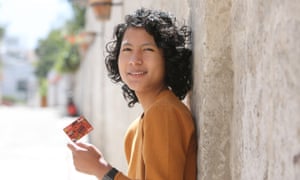
When he was seven, Jose Adolfo Quisocala created a bank for school friends in his home town of Arequipa, Peru, to save money to buy books, stationery and uniforms. Now, nine years later, the Bartselana Student Bank has 6,700 clients, all aged under 18. As well as saving, children can earn money by bringing plastic and paper to recycle at school drop-offs – the money is automatically credited to their bank accounts. Every month, the bank recycles between 15 and 16 tonnes of paper and plastic through local companies.
The idea came to Quisocala when he saw children begging at traffic lights and wondered how he could help them and their families earn and save, as well as recycle household rubbish that would otherwise become litter or go into landfill. He missed out on school to pursue his idea, but it was worth it, he says. “In my town, I was able to considerably reduce the level of child poverty, the school drop-out rate and environmental pollution.”
Quisocala also helped create the Bartselana Foundation, which converts donations of recyclable waste from local companies into funds to combat child hunger and improve education. Since the onset of the pandemic, the foundation has been making free online educational videos – explaining, for example, how to distinguish different types of plastics and paper for recycling – which it puts out via social media. “This is such important and relevant information that is not taught in school, that we had to make it public and free to watch,” says Quisocala.
Now 16, he plans to hand over the running of the bank to a new (also young) CEO in order to go to university. He intends to continue his social activism, working with the “least-favoured or forgotten groups in Latin America” and helping them profit by carrying out environmental services.
If you could make one change… “I would teach children, the young, adults and senior citizens what awaits us in the future if we continue living the way we are now. The climate plays a role in every aspect of our lives; our money, our health, agriculture, our flora and fauna. With education, people can take small steps to improve the relationship between humans and nature.” Dan Collyns
Melati, 18, and Isabel Wijsen, 20, Bali
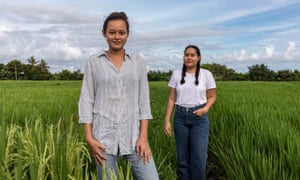
It was a school lesson on Nelson Mandela and Martin Luther King that made sisters Melati and Isabel Wijsen think about how they could change the world and in 2013, aged 10 and 12, they launched Bye Bye Plastic Bags, an initiative to stop single-use bags which is now active in 30 countries. “It organically started to grow,” explains Melati, now 20. “Young people could see a real-life example of what was possible.”
The girls’ campaign was exemplary. They started making educational booklets to explain the dangers of marine pollution and set up a pilot scheme for a plastic-free village. Next came a how-to video on making a river barrier from recycled material to prevent rubbish reaching the sea and a social enterprise scheme employing local women to make reusable bags. In 2018 they resorted to hunger strike when the governor of Bali wouldn’t meet and discuss government policy. He caved in two days later and by 2019, single-use plastic bags were banned from the island.
Now the Wijsens have launched an online learning platform called Youthopia. “It has masterclasses, workshops and mentorship. We want it to become the world’s HQ for young change-makers.” It’s hard to imagine they won’t make it happen.
If you could make one change… “I would adapt the education system to teach about these problems and create spaces for innovation. Young people are not given the tools or the guidance to think big and create new systems.” Alice Fisher
Scarlett Westbrook, 17, UK
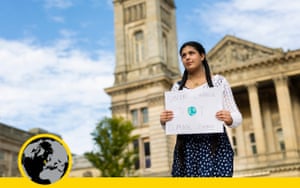
Scarlett Westbrook is a 17-year-old with an open expression, friendly smile and plaits like bell-pulls. It would be natural to assume – had you never heard her speak – that she was an ordinary schoolgirl and not the formidable climate justice activist she is. But by the age of 10, Scarlett was already going on marches and canvassing for local elections (at the time, she was “really into” Ed Miliband’s climate policies). She has grown up in inner-city Birmingham and her encouraging parents – not in any political party themselves – would tag along with her as she knocked on doors. It must have been clear then that Scarlett was not born to be one of life’s passengers.
At 13, she distinguished herself by passing an A-level in government and politics – the youngest person ever to do so. She taught herself in seven months. Her speciality was climate and education which was what, in part, led to her later work as a member of the UK Student Climate Network (UKSCN). Neither her parents nor her teachers believed Scarlett when she told them she intended to sit the A-level, so Westbrook emailed the exam board… “I kept arguing until I got my way!” (A useful talent in an activist.)
Westbrook has been one of the leading organisers of the school strikes in Birmingham and is the youngest known “regular policy writer” in parliamentary history. She won the Women of the Future Young Star award in 2020 and the Diana award this year, for humanitarian work. Scarlett is invariably modest about her achievements – not wishing to distract from what matters most to her. She now heads up Teach the Future, the impressive student-led campaign founded by her friend Joe Brindle, which aims to transform the British education system by putting the climate at its centre. It is responsible for “the first ever student bill, the English Climate Emergency Education Act” and for holding a parliamentary reception, organised and led by Westbrook, for more than 100 MPs and Lords. (It has secured cross-party support from everyone except the DUP.) She argues that climate should be “woven like a golden thread into every single subject”. And her own thinking proves impressively joined up: she talks eloquently about climate crisis in relation to capitalism, colonialism, gender inequality and pandemics.
Teach the Future’s research shows that “only 4% of students feel they know a great deal about [the climate emergency]”. But the percentage of students who are concerned is much higher (with six in 10 said to be “extremely worried” ). Scarlett believes climate action and strong community support are the way forward, adding: “Our government could choose to act on the climate but is actively choosing not to…”
While she believes in the importance of individual action, she is keen to emphasise the shocking figures that reveal collective responsibility: “A hundred companies are responsible for 71% of [global] emissions,” she says, while “the entire continent of Africa is responsible for only 2-3% of emissions.” She points out that 70% of flights are taken by 15% of people. Listening to her, I find myself daydreaming that she could make, one day, the most amazing prime minister. But when I ask if she is planning to become a politician, she flinches. “Absolutely not. I specifically want to go into medicine. I want to be a humanitarian trauma surgeon working in natural disasters or war to help people out. With the climate crisis, that is going to be an increasingly important job.”
How do you relax? “It often feels like the weight of the future is on our shoulders so it is really important to wind down and spend time with people you care about to maintain your capacity to act, and your wellbeing.”
Solar or nuclear? “Solar!”
If you could make one change… “I would implement an international Green New Deal, which would aim not only to decarbonise the economy through a 10-year, government-led mobilisation but also to create jobs and to bridge the inequality divide through investment in the areas that need it most.” Kate Kellaway
Fionn Ferreira, 20, Ireland
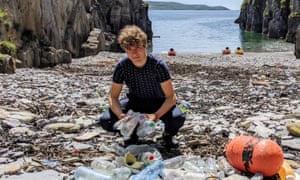
“My two loves are exploring and inventing,” says 20-year-old Fionn Ferreira, who won the top global award at the 2019 Google Science Fair for his work on reducing plastic pollution in water. It was while kayaking around the coast of West Cork, where he grew up, that Ferreira became keenly aware of the problem – not just large plastics bobbing on the waves but microplastics pervading the water around him.
Aged 15, he designed his own spectrometer to measure the amount of microplastics in local water – the readings were so high that at first he thought the machine was broken. Then he set about finding a way to remove them. “I thought, what’s plastic made of? It’s made of crude oil. And why does crude oil float on top of water? Because the polarity is different.” By adding magnetite to oil, he discovered that he could attract the microplastics in a sample of water and remove the vast majority of them with a magnet.
Now the chemistry undergrad has created his own startup, Fionn & Co, and has received funding from Robert Downey Jr’s Footprint Coalition to build a prototype device that can filter more than 90% of microplastics from tap water. He hopes to expand the technology to work in wastewater treatment plants and even at the mouths of rivers, while letting his inventive mind fly in other directions too.
Winning awards and backing at such a young age has given Ferreira a sense that youth should not be a barrier to effecting real change. “I feel like we need more people involved in innovation and invention at a small level, because every idea has the power to make a difference,” he says.
If you could make one change… “We need to get everybody to fall in love with the environment and be really, really angry about what’s happening to it. Because only with everybody on board, doing their bit, can we create change.” KF
Mya-Rose Craig, 19, UK
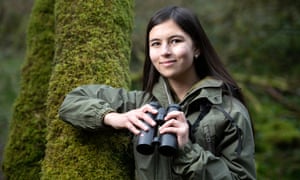
Mya-Rose Craig was nine days old when she first went birdwatching near her home in Bristol. “My parents and my older sister were massive birdwatchers. I can’t remember a time when I didn’t love birds,” she says. She has been blogging about birds as Birdgirl since she was 11 and posting on Twitter as @BirdgirlUK since the age of 12. “That was when I started becoming passionate about environmental issues, especially climate change,” she says.
It was also around this time she started noticing something about outdoor spaces. “My mum is Bangladeshi and my sister and I are half Bangladeshi and I became aware that I never saw anyone who looked like us out in the countryside. As I looked into it, I realised this wasn’t a superficial thing, it was systemic exclusion linked to the racial make-up of conservation bodies and the costs of getting into nature, among other things. Conversations with my cousins made me aware that birding and being in the outdoors are seen by non-white people as really white hobbies.”
Craig set up Black2Nature, a non-profit organisation that campaigns for equal access to nature for all, runs nature camps and activities for people traditionally excluded from the countryside and campaigns to make the nature conservation and environmental sectors ethnically diverse. Her activism has won her a platform on television (Springwatch, Countryfile) and radio (Start the Week) and a doctorate in science from the University of Bristol.
Now 19 and studying at Cambridge University, Craig has just publishedWe Have a Dream (Magic Cat), a book of interviews with 30 young environmental activists of colour – “people who weren’t getting the platform from the media that they deserve”.
If you could make one change…. “I’d get genuine action from our leaders, right now.” Lisa O’Kelly

Iris Duquesne, 18, France
Dubbed “France’s Greta Thunberg” by the French media, Iris Duquesne was 16 when she joined 15 other teenage climate activists, including Thunberg, in late 2019 to bring a landmark legal complaint to the United Nations against France, Brazil, Germany, Turkey and Argentina. Their charge – that these countries were violating their rights as children by not taking sufficient measures against climate change – resonated around the globe.
Last week the UN declared it was unable to rule on the case, saying the young people must first bring lawsuits in each of the five state’s national courts, despite tomes of case law showing that no such procedures would succeed. Speaking through her legal team at the non-profit Earthjustice, Duquesne said: “We are all very disappointed but unfortunately not surprised. We have seen governments and officials ignore the climate crisis over and over again and today was no exception. The fight for climate justice is not over, and we will keep pushing with or without the Committee’s help.”
If you could make one change…. “I’d use education worldwide to instil a real sense of climate responsibility in the next generation.” LO’K
Jakob Blasel, 21, Germany
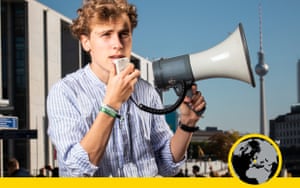
Jakob Blasel’s blond curls have been a regular sight at Fridays for Future protests in Germany since the then 18-year-old organised the country’s first climate strike, outside the regional parliament in Kiel in December 2018. He proved a canny organiser and passionate motivator, rallying students through WhatsApp chat groups or by spraying messages on the pavement outside their schools.
“From day one it was very important to me that Fridays for Future wasn’t just made up of kids who already cared about environmental issues,” he says. “It was about starting a movement that spoke to an entire generation.”
Three years later, Blasel is knocking on the doors of the Bundestag in Berlin: as a Green party candidate in his home constituency in Schleswig-Holstein, Germany’s northernmost state, he gained 23,831 votes at September’s federal elections, only narrowly missing out on a parliamentary seat via the party’s list.
The eldest of three brothers, Blasel says he was vaguely aware of climate change as a child. “But it wasn’t until I was 15-16 that the climate crisis became something that caused me distress.”
In 2017 he watched a Norwegian documentary about the global textile industry. “How could it be, I asked myself, that my teenage peers and I were wearing clothes that were produced under inhumane conditions in the global south? From that, I moved on to thinking about how clothes could be produced in a way that was not just socially fairer, but also more environmentally sustainable.”
The teenager started wearing more secondhand clothes, and he convinced his parents to switch to get their electricity from renewable providers. “But there was a point where that approach reached a limit: even if I change my behaviour as a consumer, we’re still headed for an ecological and societal crisis. If I really cared about making a difference, I realised, I needed to take a political approach.”
In his campaign and on social media, Blasel describes himself as an “1.5C ultra”, claiming a term usually employed by fanatical football supporters. “Maybe that’s a little bit of a joke,” he says, “but in terms of real politics, it means I am convinced that every possible effort needs to be made to limit global warming to 1.5C.
“Now I see a lot of politicians realising that we need to have more ambitious climate targets. But they are still telling fairytales about how we will get there: that technology will magically solve climate change, that we just need to leave it up to the markets. We already have these technologies, we just need to use them. And at the moment that’s not happening to the right extent.”
Blasel says his run for the Bundestag has made him understand better why the political debate on the climate crisis has got stuck, and how it could be made to start moving again. “Being an activist means constantly pushing your own interest to the foreground, while the art of being a politician lies in reconciling different interests.”
The German Green party could hold a key role in the next government, as one of three coalition partners in a liberal-left power-sharing deal. Blasel says he’s planning to slip back into his old activist roles to remind his party of its promises while coalition talks are ongoing. “I will keep on giving my best to fight the climate crisis. Whether I do that from parliament or as an activist is almost irrelevant.”
Who is your climate hero? “Stefan Rahmstorf, the German climatologist who was one of the earliest scientists to lay bare the dramatic extent of the climate crisis.”
Solar or nuclear? “Solar. People don’t feel safe around nuclear power plants. I don’t think most people who are still evangelising about nuclear power have thought their position through.”
If you had the power to make one change to help solve the climate crisis what would it be? “The switch to renewable energy has to be the basis for every step we take to address the crisis.” Philip Oltermann
Disha Ravi, 22, India
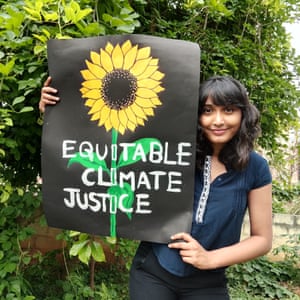
Disha Ravi experienced climate change growing up in rural India long before she knew what it was. “My grandparents are farmers and faced water shortages; my mother had to carry water from the common well before she left for school and none of us realised that this was the result of the climate crisis. Only when I was 18 did I understand it – and the inaction from our leaders.”
Ravi co-founded the Indian branch of Fridays for Future (FFF) in 2019 and spent two years organising workshops, local clean-ups and tree planting. She is also the family breadwinner, with her job at a vegan food company in Bengaluru, where she lives with her mother.
One campaign close to her heart was the 2020-2021 Indian farmers protest when a set of farm bills that seemed to favour corporations over farmers sparked huge outcry in India, especially over minimum prices for produce. When Greta Thunberg tweeted about the campaign in February, it was Ravi who made international headlines. She was arrested for sedition and criminal conspiracy and taken to Delhi where she was held for 10 days. Police said a social media toolkit Ravi had edited for the campaign had caused disaffection and disinformation.
Ravi is unable to discuss her ongoing legal case but her campaigning spirit is undiminished. “I have seen my own house fill with water in a landlocked city, trees cut to grow the GDP, and poison released in rivers as businesses push off responsibility. I refuse to let this continue for others.”
If you could make one change… “People in India face the climate crisis on a daily basis, but access to the latest science around the environment is still limited to elite private schools. Education will bring about awareness and the climate action we need.” AF

Lesein Mutunkei, 17, Kenya
Lesein Mutunkei was 12 when he decided that for every football goal he scored, he’d plant a tree. He realised the idea could go big – after all, “the climate crisis is a universal problem and football is a universal game”. He got his school in Nairobi signed up and started Trees for Goals as a movement. In 2019, aged 14, he went to the Kenyan Ministry of Environment and the scheme became national. This year he’s a Children’s Climate prize finalist.
If you could make one change… “I would ensure Fifa, all leagues, clubs and schools and 3.5 billion fans across the world took up Trees for Goals and use the power of football to tackle deforestation, which is the second biggest contributor to climate change.” AF
Amy and Ella Meek, 18 and 16, UK
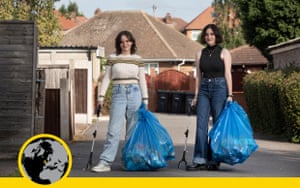
Amy and Ella Meek founded Kids Against Plastic in 2016 after finding out for the first time about the effects of plastic pollution. The sisters were being home schooled and their parents, both teachers, decided they should learn about the UN’s global goals for sustainable development. The goal that piqued their interest was number 14: Life below water. “We started seeing all these images of sea creatures tangled up in plastic,” says Amy, now 18. “It was just heartbreaking to see and really shocking.”
“Plastic pollution wasn’t so much in the news then, so we were completely unaware of how the plastic we were using and throwing away was having such a negative impact,” says Ella, 16. “We realised that a lot of other ordinary people were probably unaware of it too, so we decided to take action.”
Their campaign against plastic waste had small beginnings. “We were quite young, only 10 and 12, so we started off by litter picking. As soon as we started picking up plastic we saw how quickly it was being replaced and that was really motivating,” says Ella.
In the five years since the sisters have picked up a massive 96,685 pieces of single-use plastic. Their target is 100,000, because that is the number of sea mammals that die each year as a result of being trapped in plastic or eating it. They have also given hundreds of talks at schools and festivals, including a TEDx talk, and launched nationwide “Plastic Clever” schemes to help UK schools, restaurants, businesses, festivals and councils to reduce the amount of single-use plastic they use.
How do you both relax? “We’re just normal teenagers so if we’re not campaigning we’ll spend time together, watch TV, read books, talk to our friends.”
Lab beef or grass-fed? “We’re vegan!”
If you could make one change… “We’d make sure people with the power to take action take on board advice from young people.” LO’K
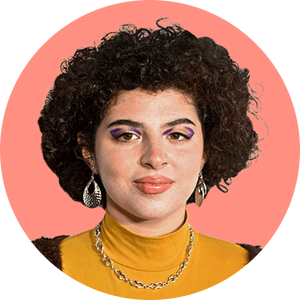
Noga Levy-Rapoport, 19, UK
In 2019, Noga Levy-Rapoport, just 17 at the time, was instrumental in organising the massive 20 September climate strikes across the UK. This involved “months of tireless work – emails, backroom meetings, travelling from school to workplace to company HQs to persuade as many as we could to join us on the streets”. Levy-Rapoport, now a full-time student at Warwick University as well as continuing to energetically campaign, believes “the impact of that work can still be seen today”.
If you could make one change… “I’d ensure governments and global leaders put an end to the greenwashing that corporations are constantly using. Greenwashing places all responsibility for an international, terrifyingly huge crisis on us as consumers, rather than on fossil fuel companies for taking advantage of our people and planet. Corporations like BP and Shell, responsible for so much damage to our environment, know that a decarbonised world is possible, a sustainable future and equitable society is possible, but for that to exist we have to end the unregulated power they have over our energy, jobs, and livelihoods.” KF
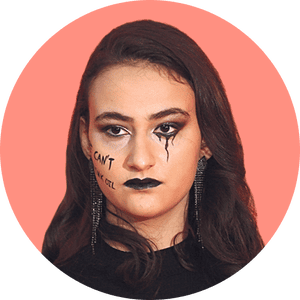
Jamie Margolin, 19, US
A Colombian-American from Seattle, Margolin founded the coalition Zero Hour in 2017, which led the Youth Climate March the following July. She was one of 13 children who sued the state of Washington in 2018 for infringing their constitutional rights by “actively worsening the climate crisis”. She now studies film-making at NYU, continuing to campaign climate matters and queer rights.
If you could make one change… “I would halt all deforestation and destruction of natural places.” KF
Autumn Peltier, 17, Canada
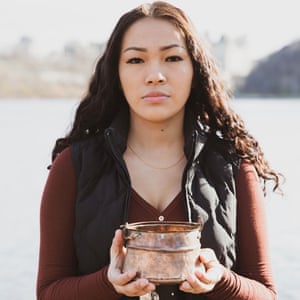
“I was eight years old and attending a water ceremony in a First Nations community not far from mine,” says Autumn Peltier, recalling the moment that spurred her to become a clean-water advocate. “I went to the bathroom and all along the hallways there were signs that read ‘Do not drink the water’ and ‘Boil water advisory in effect’.” Quizzing her mother afterwards, she learned that the drinking water in this community, in northern Ontario, Canada, had been contaminated for 24 years.
Now, aged just 17, Peltier is chief water commissioner for the Anishinabek Nation. She first attracted attention when, at the Assembly of First Nations in 2017, she told prime minister Justin Trudeau that she was “very unhappy” with his record on water protection and oil pipeline projects.
The following year, she addressed world leaders at the UN General Assembly on the subject of water pollution. “Those platforms tell me that my message is being heard and Canada has to answer at that level,” she says. “It shows me I’m being effective for the water, the children and our rights as indigenous people of this land.”
If you could make one change… “I would encourage any new member of parliament to spend a week on the land and in a community that can’t drink water and live in the houses that need repairing. Have the ones in power experience what we are fighting for and why we do this advocacy work.” KF

Grace Maddrell, 16, UK
Grace Maddrell was barely into her teens when she first went on school strike for the climate. Now, at just 16, she has published Tomorrow Is Too Late (Indigo Press), a book of essays and stories by young activists from around the world illustrating why it is imperative that we act now to avert climate catastrophe.
If you could make one change…. “This crisis has been caused by colonialism, capitalism, and inequality. If we could change the attitudes that perpetuate these things, it would help build a better world.” LO’K